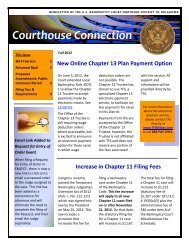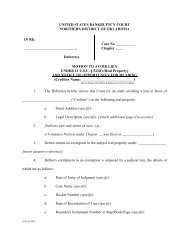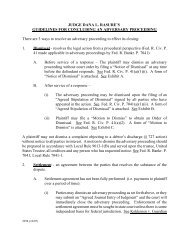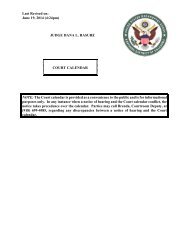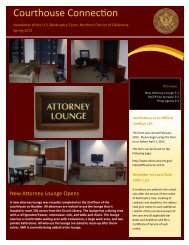The Published Opinions of Judge Terrence L. Michael
The Published Opinions of Judge Terrence L. Michael
The Published Opinions of Judge Terrence L. Michael
You also want an ePaper? Increase the reach of your titles
YUMPU automatically turns print PDFs into web optimized ePapers that Google loves.
RULING: No. <strong>The</strong> court held that the stipulated agreement between the parties<br />
which determined the priority <strong>of</strong> the claim was invalid because it<br />
violated the purpose and spirit <strong>of</strong> the Bankruptcy Code.<br />
20. In re Limited Gaming <strong>of</strong> America, Inc., 228 B.R. 275 (December 18, 1998). Case<br />
Nos. 96-00395-M; 96-00386-M.<br />
ISSUE: <strong>The</strong> issues presented to the court were substantive consolidation <strong>of</strong><br />
two bankruptcy estates and confirmation <strong>of</strong> a Chapter 11 plan.<br />
RULING: <strong>The</strong> court concluded that substantive consolidation <strong>of</strong> the two estates<br />
was proper. <strong>The</strong> court also concluded that the proposed plan<br />
comported with § 1129 after a systematic analysis <strong>of</strong> each element <strong>of</strong><br />
the rule.<br />
21. In re Klaus, 228 B.R. 475 (January 11, 1999). Case No. 98-01501.<br />
ISSUE: Whether a debtor may subdivide property whose primary use has<br />
been commercial, and in the process carve out a fully exempt<br />
homestead under Okla. Stat. tit. 31 § 1, et seq.<br />
RULING: No. <strong>The</strong> court held that the land was a “mixed-use” property, and that<br />
it was fully subject to Okla. Stat. tit. 31 § 2(C), which limits such<br />
exemptions to $5,000 when 25% <strong>of</strong> the total square footage <strong>of</strong> the<br />
improvements <strong>of</strong> the claimed homestead is used for business<br />
purposes.<br />
22. In re Woodward, 229 B.R. 468 (January 27, 1999). Case No. 97-05149-M.<br />
ISSUE: Whether an attorney, who performed work for a Chapter 7 debtor’s<br />
counsel, should have his fees disgorged as a result <strong>of</strong> his failure to<br />
disclose the receipt <strong>of</strong> fees in compliance with § 329(a).<br />
RULING: Yes. <strong>The</strong> court concluded that § 329(a) is to be strictly construed,<br />
and that it is clear that the section includes disclosure <strong>of</strong> any<br />
compensation shared with another attorney because “Section 329 is<br />
a disclosure provision designed to prevent bankruptcy attorneys from<br />
extracting more than their fair share from whatever is necessary to<br />
obtain counsel <strong>of</strong> choice and avoid unfavorable bankruptcy<br />
proceedings.” <strong>The</strong> court also concluded that a failure to disclose such<br />
information could warrant serious sanctions if other evidence<br />
demonstrated bad faith on behalf <strong>of</strong> the attorney in question.<br />
8



